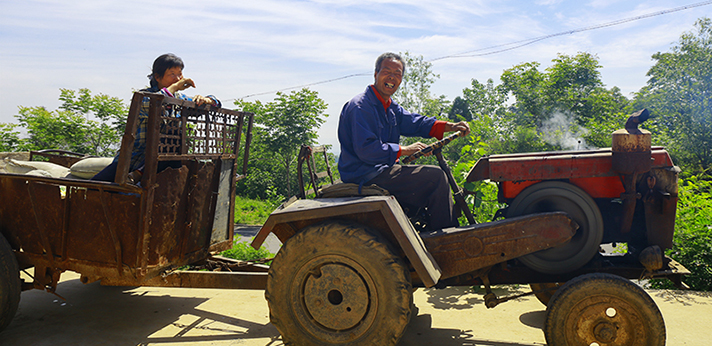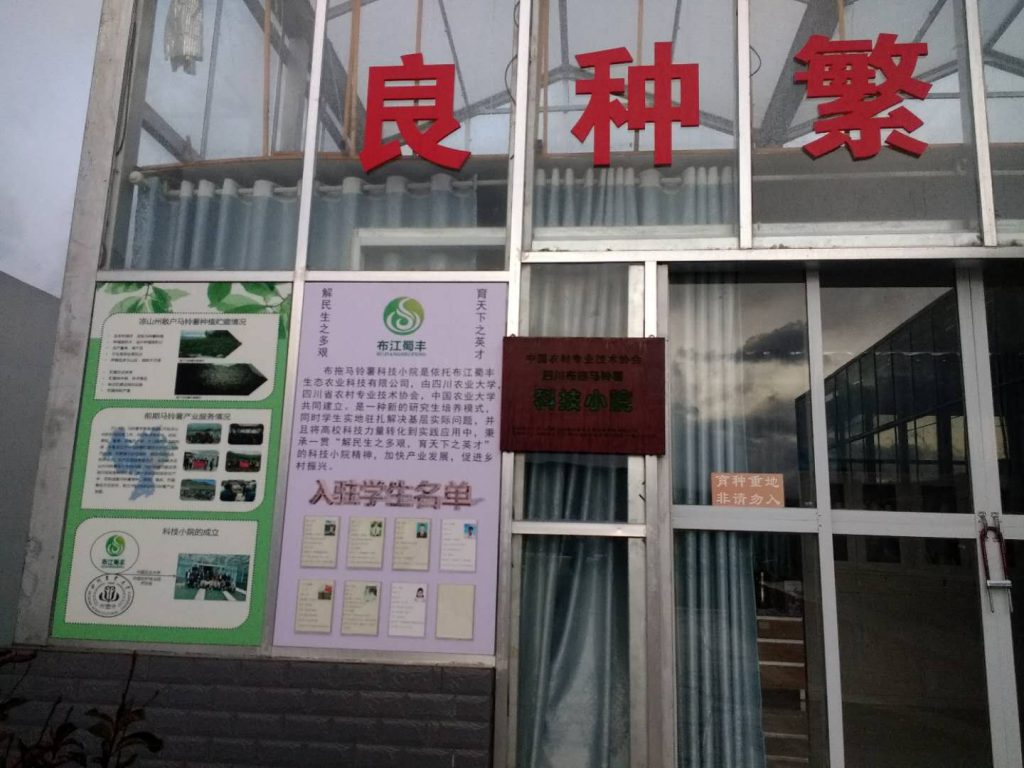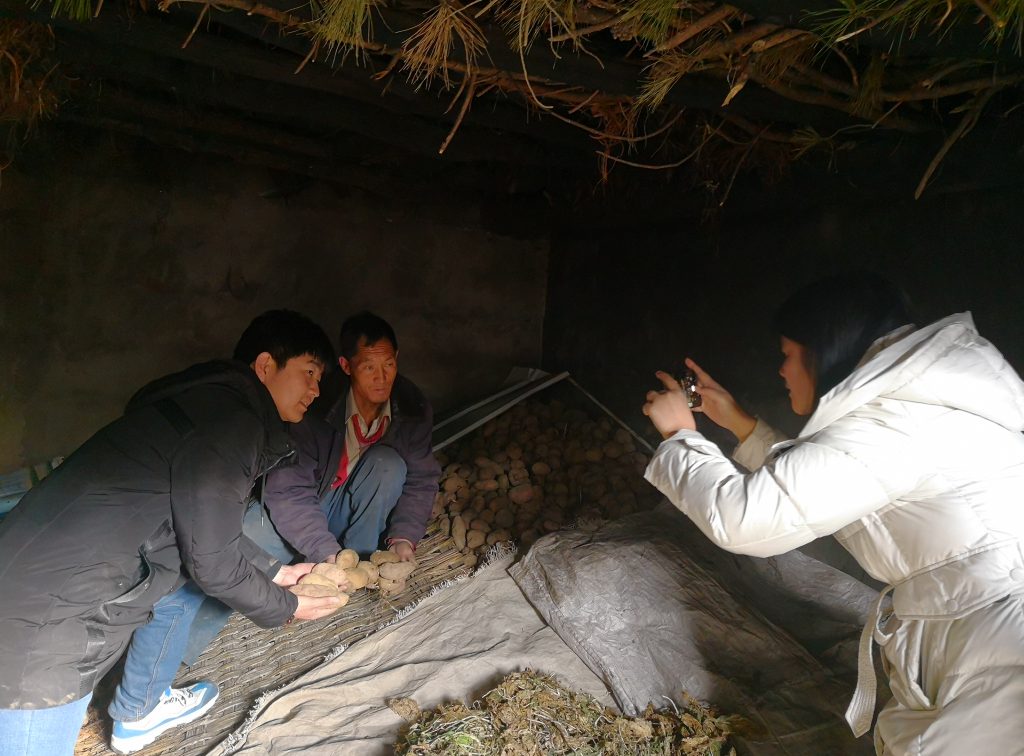
March 5, 2020, by aczjb1
Empowering potato farmers in rural China
In the context of the UN’s sustainability development goals (SDGs), small farmers, who actually feed two thirds of the developing world’s population, are very vulnerable due to the small size of their farms, their use of traditional technologies, lack of access to key resources, and no bargaining power in food supply chains. This is particularly true for those in remote, mountainous and ecologically fragile areas where there are few opportunities for the scientific community (research institutions and universities) to communicate with the rural poor directly to better understand their needs.
To tackle this challenge, a pilot project was recently awarded by the University of Nottingham Global Challenge Research Fund (GCRF) in collaboration with Sichuan Agricultural University (SAU) to focus on the empowerment of small farmers in marginal areas of Sichuan, one of the most populous – and also poor – regions of China. The aim of the project is to shed new light on the participation and contribution from university staff and students to poverty alleviation and food security.
In the past decade or so, the term, “Science and Technology Backyard” (STB) has emerged and is increasingly popular in China. This refers to a station established by an agricultural university in the countryside which allows academic staff and postgraduate students to learn from – and work with – local farmers directly, to address technical issues in agricultural production.
With a financial sponsorship from the China Rural Technology Association and China Agricultural University, STB offers advanced technologies, tailored solutions, free training and consultant services to local farmers. It is also a good mechanism for university staff and students to design and deliver their research projects, and offers an additional opportunity for young scholars’ and students’ training. STB also provides a platform for multiple stakeholders (such as governments, companies, research institutions, agricultural technology associations and farming cooperatives) to work together for sustainable agriculture and rural development. Since the first STB was set-up in 2009, more than 80 STBs have been established across China. In 2017 alone, over 70,000 farmers benefitted from training opportunities provided by STBs.
Following the success of the STB model in resource-rich areas, our project is looking to see if it can now be applied to remote, resource-poor and mountainous areas of China where traditional technologies, a subsistence agriculture and self-sufficient economy are dominant.
With support from Sichuan Provincial Government and SAU, we visited Butuo Potato STB, the first STB set-up in the poor and minority areas of China since 2019. Located in a Yi minority county, Butuo is one of the key poverty-stricken counties with high mountains and low temperatures, where potato is a major crop for family food and livelihood security. One of the aims of the Butuo Potato STB is to disseminate high quality potato seeds for the growth of both products and revenues of potato farmers. Through the field visit to the STB and to more than ten villages across the county, we discovered a range of insights.
The Butuo Potato STB has significantly accelerated the take up of high-quality potato seeds in Butuo and neighbouring counties. For instance, the supply of these potato seeds has increased from 1 million grains to 2 million grains which benefited over 300 farmers in 2019. These seeds have contributed in a growth of potato products per unit of up to 30% due to the efficiency of the seed potato.
The successful initiative of Butuo Potato STB in potato innovation cannot be separated from both government support under the poverty alleviation programme and also partnership with a local, state-owned agribusiness company, Bu-Jiang Shufeng Ecological Agriculture Technology Co. LTD. The former provides financial subsides for local farmers to adopt the new variations of potato seeds whilst the latter provides facilities for the STB team from Sichuan Agricultural University (SAU) to participate in and contribute their knowledge and skills in potato seeding and breeding.
Alongside the growth of potato products and income, the Butuo Potato STB team has paid special attention to the nutrition of sprouted potatoes and the health effect this has on the rural poor, who are heavily dependent upon the potato for food.
Without a dedicated potato storage facility, for instance, local farmers put potatoes into any available spare space for storage and as a result have to eat sprout potatoes for more than a half year. To cope with this challenge, the research team from SAU developed a special variation of potato which is suitable to the local environment. They also introduced a biological method to store potato products, in order to delay the sprout for a couple of months, with only a little extra cost to farm households. The initial tests in local farm households have been successful and now it is time to disseminate this technology more widely.
Regarding the gaps between the availability of technological supply and the application to local potato farmers, there is a lot of work to be done by Butuo Potato STB and its local partners. Compared with other regions in China, the STB in Butuo faces constraint from the following factors:
1) Resistance to adoption of new technology
2) Geographic remoteness, wide-spread poverty and subsistence agriculture
3) The underdevelopment of leading farmers or potato cooperatives for technological demonstration and dissemination
4) Poor Mandarin language skills among Yi people – a barrier for STB members to communicate with local farmers.
The field visit to Butuo Potato STB suggests that building a STB in poor areas offers an important channel for university staff and students to understand and empower small farmers by mobilising and integrating internal and external resources. To do so, a multi-dimensional innovation platform needs to be developed by redefining and broadening STB function in the poor areas of China. The necessity and feasibility of a new version of STB to empower small farmers in the poor areas will be a topic of our GCRF Pilot Project to be further discussed in following blogs.
This article is written co-authored by Dr Bin Wu, Senior Research Fellow at the Haydn Green Institute and PI of GCRF Project on Supporting Cooperatives in China, and Professor Xiyao Wang, Associate Dean of the College of Agriculture of Sichuan Agricultural University and Leading Expert of Butuo Potato STB.
No comments yet, fill out a comment to be the first



Leave a Reply